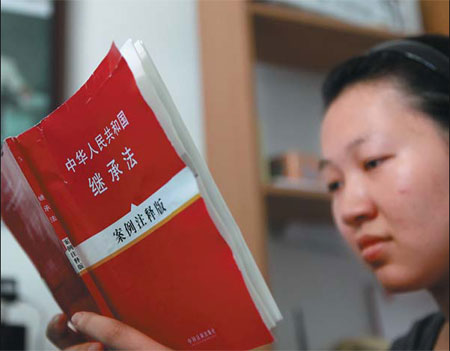Elderly willpower gets a boost
Updated: 2013-07-09 07:09
By Yang Yang (China Daily)
|
||||||||
|
A China Will Bank staff member displays standard will forms. There are more than 10 types of will, designed to meet different needs. Photos by Cui Meng / China Daily |
|
An employee of the China Will Bank studies China's Law of Succession. |

A new nonprofit organization is helping senior citizens overcome the difficulties inherent in drawing up a legally binding will and avoiding family disputes in the process, as Yang Yang reports from Beijing.
Early on a sunny summer morning, a dozen elderly people were sitting on benches outside a handsome house in Xijiaominxiang hutong, Beijing, fanning themselves while waiting for the China Will Bank to open for business. Wei Jinding, 91, was among those waiting. Although he wears a hearing aid in his left ear and can only walk with the aid of a stick, he looks hale and hearty. Accompanied by his eldest son and daughter-in-law, Wei was waiting to obtain advice about making a will and ensure that his three apartments are inherited by his intended recipients after his death.
"This is my own decision," said Wei, taking out a five-page document he had drafted at home. Although his eldest son and daughter-in-law have lived in one of his two-room apartments for several years, Wei was concerned that if he were to die intestate, his apartments would be divided equally among his five children, in line with China's Law of Succession. That would not only go against the elderly man's wishes, but could also lead to family strife, which is the last thing he wants.
The doors opened at 9:30 am, and a little later a staff member called Wei's name. His rapid reception was the result of having booked an appointment in April, but around 20,000 elderly people face a far longer wait, and some won't be seen until December 2014.
Aging population
The nonprofit will bank, a six-month trial project that started on March 21, is the first of its kind in China. Although it provides free consultancy services to those aged 60 or older who need advice about making a will, the act of drawing up the document is left in the hands of legal professionals.
Among the services on offer are video recording, collection of fingerprints and storage of the will. The NGO also provides indelible ink and non-degradable paper to ensure the documents remain in pristine condition and will be legible when eventually required.
The trial period is intended to identify problems with the concept and suggest an optimum operating procedure. When the six-month assessment period ends, the project will be extended to cities across China and will eventually become a nationwide service. The concept is badly needed, because the country's population is aging rapidly.
By the end of 2012, the number of people in China aged 60 and older was 194 million, 14.3 percent of the population, according to the National Bureau of Statistics, and it's estimated that in 20 years, the number will have doubled.
While many senior citizens have applauded the service, questions remain about the bank's nonprofit status and the feasibility of providing legally binding wills that won't provoke disputes.
"I think many people are mistaken about the function of the China Will Bank," said the chairman, Chen Kai. "Notaries are in charge of drawing up wills and lawyers are responsible for executing them, but the intermediate stage has been missing. We will store the wills and provide materials for the executors, but we are not attempting to usurp the roles played by notaries and lawyers."
Chen said that the will bank is about ensuring people's livelihoods. It receives assistance and financial support from the government and related organizations, such as the Beijing Federation of Industry and Commerce. When the pilot period ends, the bank will also raise funds directly from the public. "We will always be a nonprofit organization," said Chen.
However, because the will bank doesn't make or execute wills, the most common problems are likely to remain unresolved.
"The law relating to wills is very complex and contains many loopholes, which affects the entire legal procedure surrounding them and their execution," said Yang Xiaolin, a lawyer at Beijing Yuecheng Law Firm.
Tan Fang, a veteran lawyer based in Shanghai, is also one of 40 pro bono lawyers at the bank: "China's Law of Succession does not provide a legal basis for inheritance management and execution," she said.
'Virtual property'
In many countries, inheritance management is a mature concept. "When a testator makes a will, it is held by the law firm involved. When the testator dies, the lawyers notify the inheritors and execute the will," she said. "But Chinese law doesn't include the concept of a 'will manager and executor', which is something we lawyers have suggested for inclusion when the law is amended in 2014.
"In China, agencies notarize wills, but the wills aren't held by any specific organization; usually they are kept by the testator. The current law lacks clear identification of the testator and the extension of bequests. For example, it doesn't cover Internet inheritance, which includes 'virtual property' such as online stores, blogs and e-mail accounts owned by the deceased."
Yang said the Civil Procedural Law and Lawyer Law - the responsibilities and obligations of lawyers and law firms - limit the areas in which solicitors can operate, which often means they are unwilling to help people draw up a will.
"Usually people pay us very little to make wills; but guaranteeing the legality of the document requires a lot of work, including identifying the testator's mental state and verifying the inheritance, which is really complicated. It presents great risks to lawyers - risks that may only come to light in eight or 10 years, when the wills are executed," he said. "Notary agencies in China can perform those tasks."
"My firm charges 20,000 yuan ($3,260) to make a will, which usually scares people off. Besides, Chinese people are often unwilling to hire a lawyer to make a will. They often draft one on their own and if a dispute occurs, it's usually too late to turn to the lawyers. Without professional help, about 60 percent of wills in inheritance cases are judged by the courts to be invalid," he said.
Lawyers are also concerned that next year's amendment of the law will further complicate the legal procedures in the execution of wills.
Yang Xiaolin said the amendment may revoke the highest legal power of notarized wills and that "notary agencies will be just one of the ways to make a legally binding will, so that when there is a dispute over authenticity, more work will be required, even if the document has been notarized".
Rising personal wealth
The Law of Succession was enacted in 1985, when China still operated a planned economy and generally there was little private property. However, since then, living standards and personal wealth have risen tremendously. The concept of private property has expanded and now includes new items, such as Internet property, which are not included in the law as it stands.
Technological innovation is offering people more ways to draw up a will; the traditional pen and paper method still dominates, but wills drawn up via digital tools such as computers and voice- and video recorders are not legally binding.
Those anomalies have resulted in next year's proposed changes, but lawyers and the judiciary are still debating the content of the amendment, including the definition of private property and the legality of new ways of making a will.
Chen Kai disagreed with suggestions that one-third to one-half of the inheritance must be divided equally among the inheritors: "It's an outdated consideration, and in many cases it's unnecessary, because the people involved have already agreed that one of their number should receive the entire inheritance."
The point has proved to be a stumbling block for Wei Jinding's daughter-in-law: "Why does the law demand that the apartments have to be divided equally among everyone? That's unnecessary. We have been living in the apartment for ages and our brothers and sisters all have their own houses. To avoid any quarrels, my husband's father has decided to leave one of the apartments to us," she said.
Between 1990 and 2009, the number of inheritance cases nationwide averaged 20,000 every year, the People's Court Daily reported.
Yang Xiaolin said he has not seen any noticeable growth in the number of inheritance cases in recent years, but for his legal business, cases such as these are a promising growth sector.
However, Tan Fang in Shanghai said inheritance cases are increasing in number and complexity. In 2012, Shanghai No 1 Intermediate People's Court reported that the number of cases in the city has been rising at a rate of 20 to 30 percent every year. Shanghai and Beijing are among the cities with the fastest-aging populations, and Shanghai is reported to have the highest proportion of elderly people.
Tan said that recently she has dealt with a rising number of inheritance cases, and the identification of legal inheritors becomes far more complex if the testator or their survivors have emigrated. Another factor is that the scale of inheritance is growing as personal wealth increases.
When disputes over authenticity occur, the will bank, as the third party, can provide corroborative evidence, such as fingerprints, video testimony and signatures.
In days gone by, the Chinese did not make wills. Traditionally, the death of the "family manager", usually the father, resulted in a conclave of respected older people from the neighborhood, which supervised the division of the inheritance based on age-old rules.
Nowadays, the value of inheritances is rising, partly as a result of higher property prices, and the "big family" system has broken down because family members no longer share the same dwelling. In response, an increasing number of elderly people have decided to prepare formal wills to prevent arguments about inheritance.
"We didn't expect the will bank pilot to attract so much attention, but Chinese people are now changing their attitude toward making wills," said Chen.
Contact the writer at yangyangs@chinadaily.com.cn

(China Daily USA 07/09/2013 page8)

 Quebec disaster death toll jumps to 13
Quebec disaster death toll jumps to 13
 Mourn for students in San Francisco air crash
Mourn for students in San Francisco air crash
 Rolling stone finally settles
Rolling stone finally settles
 Double-decker bus caught fire in Shanghai
Double-decker bus caught fire in Shanghai
 China, Russia begin live-fire navy drill
China, Russia begin live-fire navy drill
 Grape expectations for Xinjiang county
Grape expectations for Xinjiang county
 Air crash victims' parents leave for US
Air crash victims' parents leave for US
 Victim's family mourn loss
Victim's family mourn loss
Most Viewed
Editor's Picks

|

|

|

|

|

|
Today's Top News
Laden's life on the run revealed
US mulls hastening withdrawal from Afghanistan
Country singer Randy Travis in critical condition
Police look for suspects in Brazil soccer slaying
China's inflation grows 2.7% in June
Nuclear power pricing system launched
Air crash victims' parents leave for US
Terror law called for after attack
US Weekly

|

|








